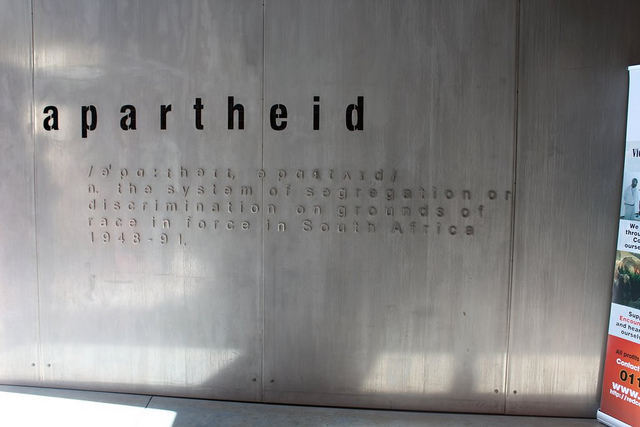Why immigration controls resemble apartheid in their adverse consequences for freedom
The attempt to control some people can all too quickly escalate into an effort that depends for success on controlling everyone, argues Chandran Kukathas in comparing immigration controls with South Africa’s notorious apartheid laws.
The governments of most European states are eager for foreigners to enter their countries and often boast of their success in attracting people to come in as tourists, whose spending boosts certain industries and swells state treasuries. They want high fee paying students, or wealthy investors willing to set up businesses, or specialist workers in short supply, be they engineers or footballers or nurses. Foreigners are welcome, if they are of the right kind, come for the right reasons, and stay for the right length of time. The more the merrier. Provided everything is kept under control. But control—even attempted control—comes at a cost. One of those costs is the freedom of citizens and residents.
Here’s where immigration controls in liberal democracies and apartheid in South Africa after 1948 share some similarities. In both cases the effectiveness of the policies depends in the end on controlling not just outsiders but also insiders – citizens and residents. It is widely assumed that immigration control is a matter of keeping people from entering a country, and the rhetoric of control encourages this impression. Cities, public facilities, and social services are routinely described as bursting at the seams or stretched to the limit, unable to cope with sudden influxes of large numbers of foreigners, or the growth of a population swelling steadily because of a positive rate of net migration.
But a little reflection should tell us that the key is to control not so much movement across borders as what people do within borders. It’s really not simply about numbers, and certainly not about foreigners crossing borders. Regulating immigration is not just about how people arrive, but about what they do once they have entered a country. It is about controlling how long people stay, where they travel, and what they do. Most of all, it means controlling whether or not and for whom they work (paid or unpaid), what they accept in financial remuneration, and what they must do to remain in employment, for as long as that is permitted. Yet this is not possible without controlling citizens and existing residents, who must be regulated, monitored and policed to make sure that they comply with immigration laws.
This should come as no surprise. Immigrants are not readily discernible from citizens, or from residents with ‘Indefinite Leave to Remain’, especially in a multi-ethnic and multi-cultural society. So any effort to identify and exclude or penalize immigrants will generally require stopping or searching or questioning anyone. If immigrants must show their passports at borders, everyone will have to, including returning citizens. If immigrants must present their credentials at internal checkpoints, then everyone, including citizens, will have to do so—if only to prove that they are not immigrants.
But the extent of the intrusion must go deeper. Prime Minister David Cameron promised to strengthen the UK’s internal borders through deportation and a crackdown on housing entitlements. ‘Since I have become Prime Minister,’ he said, ‘we have made it harder to get a driving license, to get a bank account, to get a council house. We have removed more people. All of these actions – the internal border – matter, as it were, as well as the external border.’ Yet making these things harder for immigrants must also make things harder for existing residents and citizens. If an immigrant must prove that he or she has a right to rent, so must a citizen prove that he or she is not an immigrant who lacks that right. And the landlord must assume the burden of verifying that his tenants are entitled to rent—and that the right has not expired in the course of the tenancy.
I mmigration controls are controls on people, and it is difficult to control some people without also controlling others. Sometimes it is because it is not easy to distinguish those over whom control is sought from those who are considered exempt. At other times it may be because it is not possible to restrict particular persons save by coopting others without whose cooperation success would be impossible. And on occasion it may be necessary in order to control a few to put the liberty of almost everyone into abeyance. Immigration controls are not unique in this respect—the logic of human control is everywhere the same.
mmigration controls are controls on people, and it is difficult to control some people without also controlling others. Sometimes it is because it is not easy to distinguish those over whom control is sought from those who are considered exempt. At other times it may be because it is not possible to restrict particular persons save by coopting others without whose cooperation success would be impossible. And on occasion it may be necessary in order to control a few to put the liberty of almost everyone into abeyance. Immigration controls are not unique in this respect—the logic of human control is everywhere the same.
This was the logic of Apartheid. Controlling who could enter from the bantustans required controlling the movement of black people within white society. The so-called ‘pass laws’ that first appeared in the nineteenth century to limit and control the movement of black labour, were extended to require both male and female Africans to carry ‘reference books’ detailing among other things, employment record, marital status, taxes paid, and official place of residence—and failure to carry the ‘dompas’ eventually became a criminal offence punishable by a prison sentence. By 1970 not only Blacks but also Whites, Coloureds and Asians were issued with (though not all were obliged to carry) similar documents under the Population Registration Amendment Act. Even when it is possible to identify some people readily, by skin colour or other other visible characteristics, it is not easy to control them without controlling others.
It is tempting to dismiss the analogy between Apartheid and immigration controls. South Africa was until 1994 an avowedly racist state, which not only restricted movement, and regulated labour markets (to protect white wages), but also used extreme violence to suppress dissent. But the aim of the analogy is not to suggest any identity between Apartheid South Africa and states with immigration controls. The point is rather to draw attention to the way in which the control of some quickly comes to require the control of all. In the South African case, controlling black Africans necessitated building an institutional structure that involved controlling blacks, coloureds and whites alike. In the end, it meant monitoring white newspapers, prohibiting intermarriage, conscripting white men to strengthen the security arms of government, controlling the local as well as the foreign media, censoring books, films and music, strong-arming the courts, and using force against all citizens.
When immigration controls fail to achieve their ends, governments are invariably pressured or tempted to extend that control in a way that bites into the freedom of ordinary residents and citizens. Employers, landlords, and educational institutions are subjected to harsher punishments for hiring, housing or hosting would-be immigrants, and are in the process turned into agents of the state, obliged while trying to run their own affairs also to do the work of regulating, monitoring and reporting to the government in order to preserve their right to operate—or to stay out of jail. People will find their relatives deported for babysitting their children upaid but unauthorized (as happened to Mrs Wang in Yorkshire in 2009); men and women will find themselves unable to bring their spouses into the country even when married with children (as happened to Elizabeth Celi-Parr, who was refused permission to sponsor her Ecuadorian husband to enter the UK because her earnings were too low); and universities will find themselves unable to operate when their licenses to admit foreign students are withdrawn for failure to monitor closely enough classroom attendance and visa compliance (as happened to London Metropolitan University in 2013).
As the pressure to maintain or reduce immigration numbers in accordance with stated targets increases, so will the likelihood of injustice against residents and citizens. Since 1930 more than one million U.S. citizens have been deported from their own country—most of them wrongly assumed to be undocumented Mexicans when they were simply Americans who, as citizens, have never been under any obligation to carry any documentation.
—
Note: this post represents the views of the author and not those of Democratic Audit UK or the LSE. Please read our comments policy before posting. UK border agency photo credit: Peter Facey [via Geograph], CC BY SA 2.0
—
 Chandran Kukathas is Professor of Political Theory and Convenor (Head of Department) in the Department of Government, LSE. He previously worked at the University of Utah, Oxford and in Australia. Chandran is the author of The Liberal Archipelago: A Theory of Diversity and Freedom. He is currently working on a book entitled Immigration and Freedom.
Chandran Kukathas is Professor of Political Theory and Convenor (Head of Department) in the Department of Government, LSE. He previously worked at the University of Utah, Oxford and in Australia. Chandran is the author of The Liberal Archipelago: A Theory of Diversity and Freedom. He is currently working on a book entitled Immigration and Freedom.






 Democratic Audit's core funding is provided by the Joseph Rowntree Charitable Trust. Additional funding is provided by the London School of Economics.
Democratic Audit's core funding is provided by the Joseph Rowntree Charitable Trust. Additional funding is provided by the London School of Economics.
[…] This article was originally posted on Democratic Audit UK and gives the views of the author, and not the position of USAPP – American Politics and Policy, […]
Why immigration controls resemble apartheid in their adverse consequences for freedom https://t.co/6QHNpARtEX via @LSEPubAffairs
[…] This article was originally posted on Democratic Audit UK and gives the views of the author, and not the position of EUROPP – European Politics and […]
Why immigration controls resemble apartheid in their adverse consequences for freedom https://t.co/CP8RsjSI3V @iapem
In what respect to immigration controls resemble apartheid? https://t.co/OJimh4ZRTm
Why immigration controls restrict the freedom of citizens https://t.co/blPUH5NdYL @democraticaudit #immigration #migrantcrisis
Why immigration controls resemble apartheid in their adverse consequences for freedom – https://t.co/fGjTTGArXO #GoogleAlerts
Why immigration controls (like apartheid) do spiralling damage to the freedom of citizens and immigrants alike https://t.co/5cFPc6Li7G
Fabulous by LSE colleague Chandran Kukathas: Why immigration controls = apartheid in their consequences for freedom https://t.co/rQr3KfbpJo
Why immigration controls resemble apartheid in their adverse consequences for freedom https://t.co/zrDsH74FLU #Option2Spoil
Why immigration controls resemble apartheid in their adverse consequences for… https://t.co/u1cXhuuntM
Why immigration controls resemble apartheid in their adverse consequences for freedom https://t.co/5cFPc6Li7G
Why immigration controls resemble apartheid in their adverse consequences for freedom https://t.co/bnOxPCGFnO https://t.co/3JKZyyH6Df